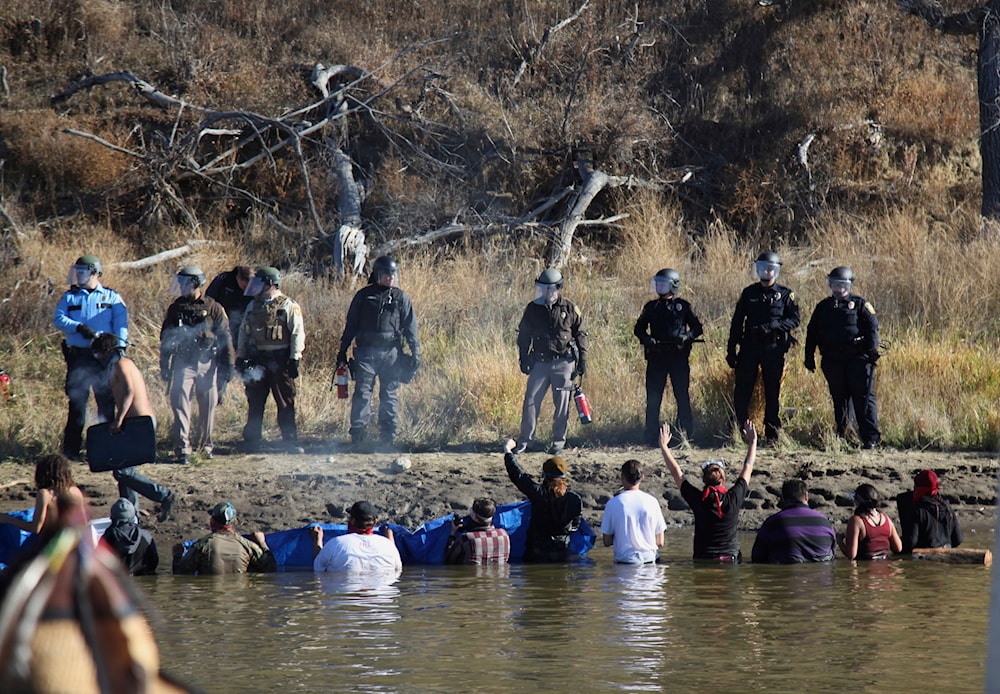Greenpeace faces $660 mln penalty over pipeline protests
Greenpeace, which had expressed concerns about receiving a fair trial in a region dominated by the oil and gas industry, warned that the loss could lead to the bankruptcy of its US operations.
-

In this November 2, 2016 file photo, protesters demonstrating against the expansion of the Dakota Access Pipeline wade in cold creek waters confronting local police as remnants of pepper spray waft over the crowd near Cannon Ball, North Dakota. (AP)
A North Dakota jury has ruled that Greenpeace must pay at least $660 million to Energy Transfer, the company behind the Dakota Access pipeline, for defamation and other claims related to protests in 2016 and 2017.
Energy Transfer had accused Greenpeace of inciting illegal activities by orchestrating a misinformation campaign that led to criminal behavior at the protest sites. Greenpeace denied the allegations, asserting that such lawsuits aim to suppress peaceful protest rights.
The jury found in favor of Energy Transfer on most counts, awarding the company a substantial financial judgment. Greenpeace, which had expressed concerns about receiving a fair trial in a region dominated by the oil and gas industry, warned that the loss could lead to the bankruptcy of its US operations. The environmental group plans to appeal the decision.
The case has drawn attention from constitutional rights experts and activists, with many expressing concerns about the potential chilling effect on free speech and activism. Greenpeace’s senior legal advisor, Deepa Padmanabha, emphasized that the trial highlighted Energy Transfer's disregard for the Standing Rock Sioux Tribe's voices, adding, "We should all be concerned about the future of the First Amendment, and lawsuits like these aimed at destroying our rights to peaceful protest and free speech."
Lawyer slams 'deeply flawed' Greenpeace trial
Kristin Casper, general counsel for Greenpeace International, vowed to continue the fight, stating, "Energy Transfer hasn’t heard the last of us in this fight." Greenpeace plans to pursue an anti-SLAPP (Strategic Lawsuit Against Public Participation) lawsuit against Energy Transfer in the Netherlands this July.
Energy Transfer expressed satisfaction with the verdict, claiming it was a victory for the people of North Dakota who had endured disruptions caused by the protests. Trey Cox, Energy Transfer’s attorney, called the verdict "resounding" and underscored that Greenpeace’s actions had been unlawful.
However, concerns about an unbiased jury were prevalent throughout the trial, given the local community’s strong ties to the fossil fuel industry and the widespread disdain for the protests. Greenpeace also alleged that mysterious right-wing mailers aimed at influencing the jury pool could have tainted the proceedings. Despite attempts to move the trial, these efforts were rejected by the courts.
Legal experts, including Kirk Herbertson of EarthRights International, argued that the trial’s tactics undermined Greenpeace's ability to present a fair defense. Marty Garbus, a veteran First Amendment lawyer, called the trial “deeply flawed” and expressed confidence that Greenpeace had a strong case on appeal. He concluded, “I have never witnessed a trial as unfair as the one against Greenpeace.”
The case is part of a broader legal effort by Energy Transfer, which originally filed a federal racketeering lawsuit in 2017. Although the federal case was dismissed, Energy Transfer refiled a similar suit in state court in North Dakota.
Read next: Rich countries silence climate protests while promoting rights: Study

 3 Min Read
3 Min Read








